Sudan timeline October-December 2023: War deepens Sudan’s suffering
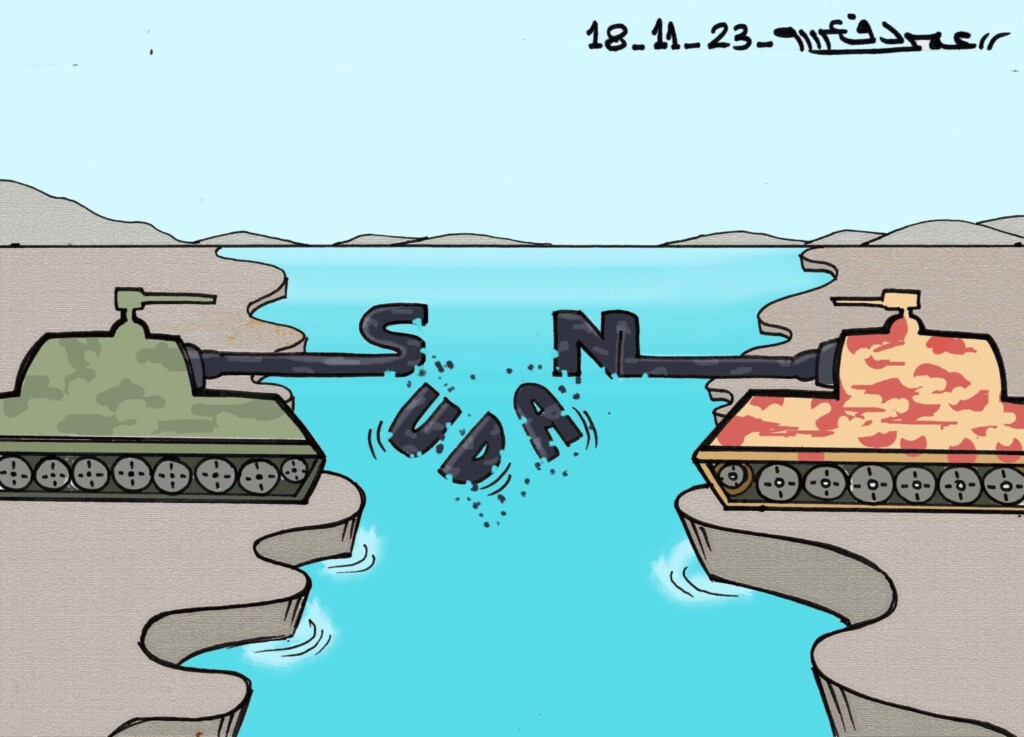
The war between the army and the RSF is dividing Sudan (Cartoon by Omar Dafallah / RD)
The armed conflict between the Sudan Armed Forces (SAF) and the paramilitary Rapid Support Forces (RSF), that broke out on April 15 over power and wealth disputes between the commanders in the run-up to a merger, intensifies in the Sudanese capital and in Darfur. The RSF wrests control of South and Central Darfur in October, and of West and East Darfur a month later. In December, the RSF invades El Gezira’s capital Wad Madani, triggering fears of RSF raids into northern and eastern Sudan. The overall situation in the country deteriorates further. According to the UN humanitarian coordinator in Sudan, the people are ‘balancing on a knife’s edge‘.
October: SAF-RSF fighting continues unabated in Khartoum. Clashes are also reported from places west of the capital. After army troops withdraw from Nyala and Zalingei, the RSF take control of South and Central Darfur, triggering fears that the militia will seize all five states in the western region. Reports about sexual violence in areas controlled by the RSF continue. About 19 million children are out of school. Thousands of them may die by the end of this year due to the scarcity of food and health services. Cholera and dengue fever spread rapidly in the country. The Sudanese Pound continues to fall. A new round of SAF-RSF negotiations begins in the Saudi city of Jeddah. Pro-democratic Sudanese groups form the Civil Front to Stop the War, with former PM Abdallah Hamdok elected as chair.
October 1: El Burhan tours northern Sudan, says that the RSF was involved in the 2019 June 3 sit-in massacre. The World Health Organisation (WHO) scales up aid after a cholera outbreak has been declared in the country. Young revolutionaries join army ranks in Khartoum to ‘expel the RSF from the city’. Heavy SAF-RSF clashes break out near Um Rawaba in North Kordofan.
October 2: Sudan’s Emergency Lawyers strongly condemn the blocking of food transport in Khartoum state. The UN Human Rights Council (OHCHR) discusses the formation of an investigative mission on Sudan. The Sudanese Pound declines further as Dollar exchange rates rise again. Former Sovereignty Council member Siddig Tawir frames the RSF attack on Um Rawaba as an attempt to expand the war.
October 3: The UN World Food Programme (WFP) warns of a “looming hunger crisis“ near the Sudan-South Sudan border.
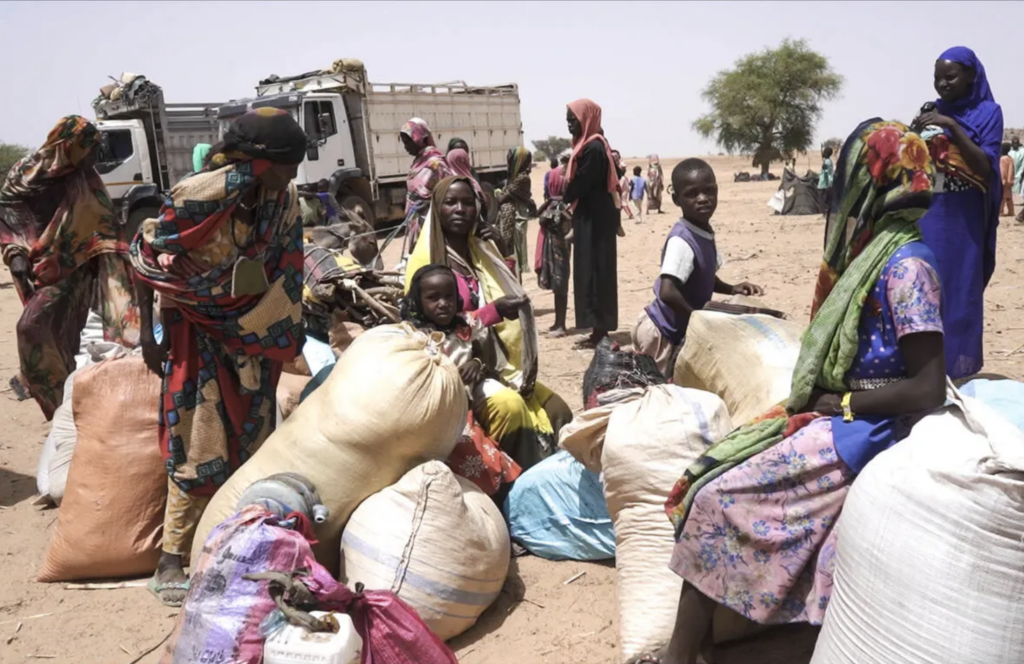
October 4: At least 20 are killed in ongoing battles for Khartoum. Sudan’s Foreign Affairs Ministry rejects the “biased” UN proposal on an investigative human rights mission. The Strategic Initiative for Women in the Horn of Africa (SIHA Network) condemns the “rampant sexual violence“ in Khartoum.
October 5: The UN humanitarian coordinator in Sudan says that the people in the country are ‘balancing on a knife’s edge‘.
October 7: The UN Office for the Coordination of Humanitarian Aid (OCHA) in Sudan reports that 5.5 million people are now displaced by the war.
October 8: RSF resumes its attacks on the SAF Command in central Khartoum. The North Kordofan capital El Obeid witnesses renewed SAF-RSF fighting. Darfur relief convoys brave perils. The declining Sudanese Pound ‘may go the way of the Lebanese Pound’. Aid organisations require US$2.6 billion to assist people in Sudan until the end of the year. The Sudanese Journalists Network calls for a broad media campaign against repeated human rights violations against reporters.
October 9: UNICEF reports that an estimated 19 million children are out of school in Sudan. Clashes between the SAF and the Sudan People’s Liberation Movement North led by Abdelaziz El Hilu (SPLM-N El Hilu) erupt in Delling, South Kordofan. Sudan and Iran announce renew diplomatic relations, after a hiatus of seven years.
October 10: Several people are killed in continued fierce fighting in Khartoum. El Obeid is in ‘a state of paralysis’ after two days of fierce SAF-RSF fighting. More than 10,000 Darfuri families who fled to eastern Chad are in urgent need of aid.
October 11: The OHCHR decides to form a fact-finding committee on crimes committed by the warring parties since April 15. Sudan’s education sector is divided over the decision to resume studies this month. Journalists call for an investigation into the killing of reporter Halima Idris. Eastern Sudanese community leaders agree to fight hate speech in the region.
October 12: According to Médecins Sans Frontières (MSF), the ‘Sudan crisis is a catastrophic failure of humanity‘.
October 13: The Hasaheisa camp for displaced people in Central Darfur is encircled by SAF-RSF fighting for two weeks.
October 15: The El Geneina Teaching Hospital in West Darfur resumes its services.
October 16: The war enters its seventh month as violent SAF-RSF clashes continue in greater Khartoum. The area of the International Criminal Court’s (ICC) jurisdiction ‘may expand soon to include all parts of Sudan’. The National Mechanism to Stop the War is waiting for an RSF response to its initiative to reach peace in the country. Universities in ‘safe and stable states’ agree to resumes studies.
October 17: SAF-RSF clashes involving heavy weapons continue across large parts of greater Khartoum. The African Union’s (AU) Peace and Security calls for an ‘African solution to the Sudanese crisis’. The US Office of Foreign Assets Control imposes new sanctions on Hamas financial facilitators in Gaza, Sudan, Türkiye, Algeria, and Qatar. The Sudanese Pound hits a new all-time low.
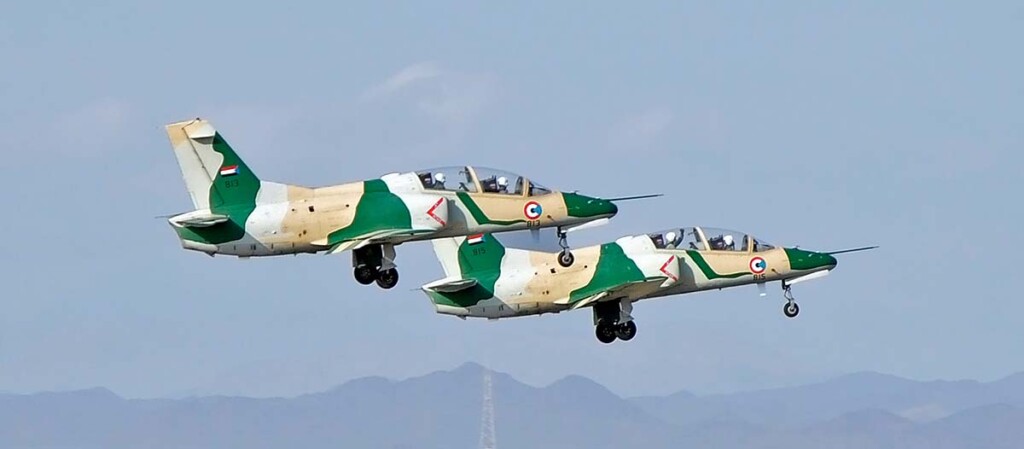
October 18: Continued artillery shelling hits several civilians in Karari in northern Omdurman. An UN expert denounces child recruitment by armed groups in the country. The trial of janjaweed leader Ali Kushayb resumes at the ICC in The Hague.
October 19: The RSF is ‘preventing food and water from entering’ the El Hasaheisa camp in Central Darfur. UNICEF and WHO warn that more than 10,000 children in Sudan will die by the end of this year. MSF suspends surgical operations at the Bashair Hospital in southern Khartoum.
October 21: The Alban El Jadeed Hospital in Khartoum North temporarily closes after an attack by RSF troops on staff members.
October 22: Shelling and air strikes persist in Khartoum state. More people flee the fighting in Zalingei, capital of Central Darfur. The risk of rape confines Darfuri refugees in eastern Chad to camps. The French Court of Asylum states that ‘Darfur in grip of indiscriminate violence of exceptional intensity’.
October 23: Dengue fever and cholera continue to spread across Sudan. Security, economic, and health conditions in Nyala are ‘close to zero‘.
October 24: Fierce SAF-RSF battles continue in Nyala, in Zalingei, and in Khartoum. The Central Bank of Sudan halves transfer limits as the Sudanese Pound plummets further.
October 26: The RSF take control of Nyala. Battles continue in Khartoum, North and Central Darfur, and South Kordofan. SAF and RSF delegations arrive in the Saudi city of Jeddah for the resumption of negotiations. The member groups of the Civil Front to Stop the War in Sudan, including the mainstream Forces for Freedom and Change (FFC-Central Council) coalition, plan a founding conference in Addis Ababa. Former PM Abdallah Hamdok is elected as chairperson of the front. Cholera and dengue fever are spreading rapidly in the country. Farmers in El Gezira report a significant decline in the production of sorghum.
October 27: RSF’s deputy commander calls on Nyala residents who fled the fighting to ‘return home’.
October 29: SAF-RSF negotiations start in Jeddah. Battles in southern Khartoum continue, Nyala faces a continued exodus, and Lagawa, in West Kordofan, is attacked by the SPLM-N El Hilu. Sudan groups launch the Where Did You Take Them?-campaign against forced disappearances.
October 30: The RSF attacks the oilfield and airport of Balila in West Kordofan and announces its withdrawal hours later. More than three million children have forcibly been displaced in the country. OCHA laments that the provision of aid in the country is riddled with bureaucratic obstacles and insecurity. The International Committee of the Red Cross (ICRC) facilitates the release of 64 army soldiers held by RSF in Khartoum.
October 31: The RSF seize control of Zalingei, capital of Central Darfur. People in Darfur fear that the entire western region will come under the control of the RSF following their capture of Nyala and Zalingei within one week. El Burhan rallies troops in Khartoum and Omdurman, amid continued fighting. A high-level Sudan delegation visits Beijing to strengthen ‘historical relations’.
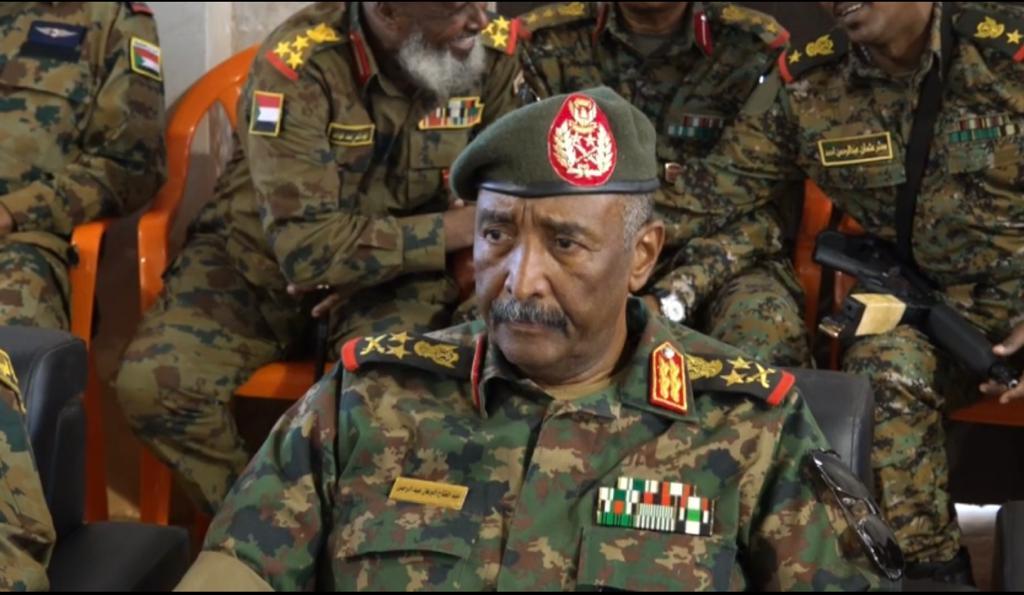
November: The SAF and RSF delegations in Jeddah agree to facilitate the delivery of aid, not on a ceasefire. The acting government in Port Sudan unilaterally terminates the UN Integrated Transition Assistance Mission in Sudan (UNITAMS). The RSF seizes El Geneina and Ed Daein, capitals of West and East Darfur. The UN secretary-general blames ‘El Burhan-Hemedti power struggle‘ for the current catastrophe. ‘What is happening in Sudan is verging on pure evil,’ the UN humanitarian coordinator in Sudan states. The SAF deputy commander accuses ‘mafia state’ Emirates of supplying the RSF with arms. The newly founded Democratic Civil Forces alliance (Tagaddum), chaired by Hamdok, approves a draft roadmap ‘to end the war and enable a democratic civil transition’.
November 1: Shelling rocks El Fasher, capital of North Darfur. A military expert says that advances in Darfur ‘will boost RSF’s leverage‘ in the current Jeddah negotiations. According to FFC-CC leaders, the success of the Jeddah talks ‘depends on army’s purge of Al Bashir supporters’.
November 2: OCHA reports that ‘Sudan is experiencing a humanitarian crisis of epic proportions‘. USA and UN are ‘deeply troubled‘ by battles for North and West Darfur capitals. Fighting continues in Khartoum, resumes in El Obeid. Darfur refugees in eastern Chad demand protection against gunmen.
November 3: El Burhan, in his function of head of the Sovereignty Council, ‘unconstitutionally’ sacks rebel member El Hadi Idris and Animal Resources Minister Hafez Abdelnabi. The UN condemns sexual violence and abductions in Sudan.
November 4: RSF takes control of El Geneina, capital of West Darfur. Khartoum state witnesses fierce fighting again, airstrikes are reported from West Kordofan.
November 5: The RSF attacks two oilfields in East Darfur.
November 6: The Sudanese government delegation is visiting China where it proposes increased oil investments. The Famine Early Warning Systems Network (FEWS NET) reports that food security in Sudan is rapidly deteriorating.
November 7: The warring parties agree in Jeddah to facilitate aid delivery, not on a ceasefire. In Sudan, they exchange accusations over a large blast at the El Jeili oil refinery. The RSF seize the Um Keddada garrison in North Darfur, commit mass atrocities in West Darfur.
November 8: SAF-RSF clashes in El Sawra and Ombadda in Omdurman result in multiple casualties. The UN Organisation for Migration (IOM) says that aid is reaching Sudan’s displaced but ‘much more needs to be done’.
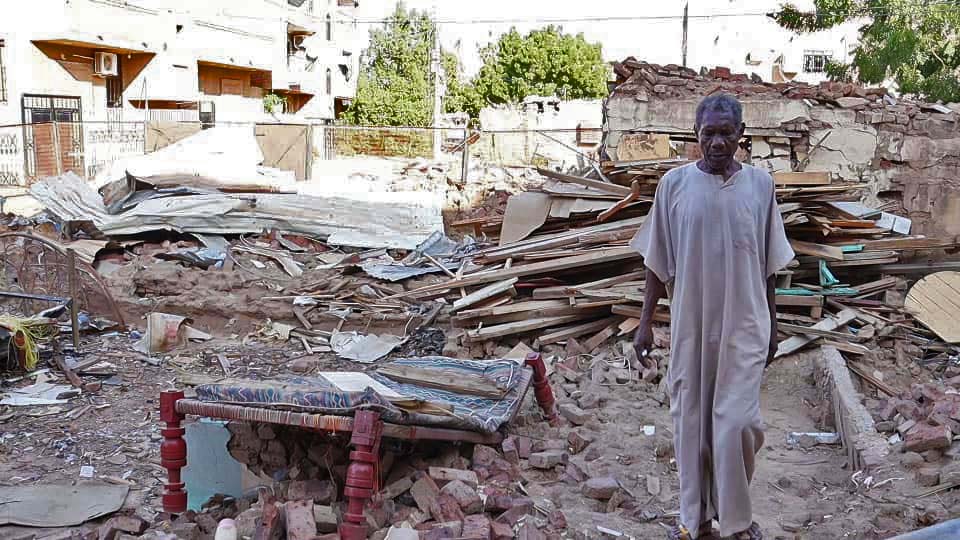
November 9: More people are killed in ongoing fierce fighting in Khartoum state. The international community reacts with revulsion at reports of mass atrocities allegedly committed by the RSF in El Geneina. The ‘fall’ of army garrisons in Darfur and Kordofan to the RSF is allegedly due to the absence of army control. The new Joint National Committee for Humanitarian Emergencies in Port Sudan discusses speeding up permits and logistical procedures for aid organisations. Teachers in ‘safe areas’ refuse to start the new school year, to avoid ‘educational fragmentation of the country’.
November 10: ‘What is happening in Sudan is verging on pure evil,’ Clementine Nkweta-Salami, UN humanitarian coordinator in Sudan tells the UN. The Shambat Bridge between Omdurman and Khartoum North collapses after a massive explosion. Clingendael reports that ‘security-business networks are holding Sudan’s private sector and democratic transition hostage’.
November 12: Analysts warn that fighting over ‘North Darfur SAF-holdout’ El Fasher is likely to intensify.
November 13: Battles continue in Jebel Aulia in southwest Khartoum, in Omdurman and in El Obeid. More bridges in Khartoum state may be targeted by the warring parties. SAF and RSF commitments made in Jeddah are questioned. The European Union states that ‘We cannot turn a blind eye‘ to the atrocities in Darfur.
November 14: The battle for Jebel Aulia still rages. The UN special advisor on genocide says that the ‘Darfur attacks may constitute genocide, crimes against humanity, and war crimes’.
November 15: SAF-RSF battles over Jebel Aulia intensify. Civil society groups urge decisive action from international stakeholders.
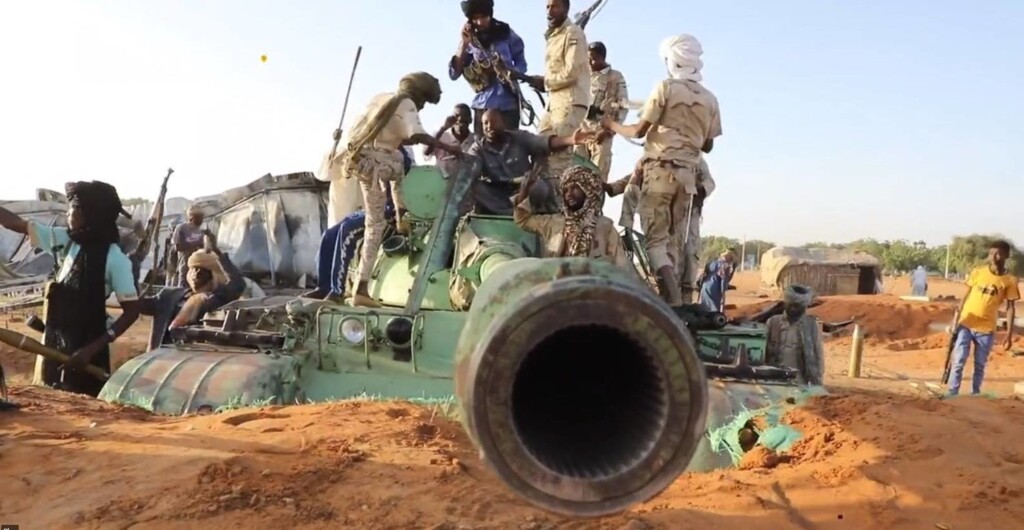
November 16: El Burhan visits Addis Ababa, while the FFC-CC convenes in Cairo. The Darfur rebel movements that signed the Juba Peace Agreement with the Sudanese government in 2020, renounce their neutrality in the war. The UN is verifying reports of interethnic violence in El Geneina. The UN Security Council reviews the latest report of UNITAMS.
November 17: The Sudanese government terminates the mandate of UNITAMS ‘with immediate effect’. El Burhan sacks El Taher Hajar, another rebel member of the Sovereignty Council.
November 19: More than 30 people are killed in an Abyei ‘land dispute’.
November 20: RSF claim victory in Jebel Aulia and seize the Ed Daein airport in East Darfur. Eritrea and Ethiopia suspend entry to Sudanese due to reported overcrowding. An FFC-CC delegation arrives in Juba to meet President Kiir.
November 21: The East Darfur SAF base ‘falls to the RSF’. Fears grow of a ‘catastrophic bloodbath‘ should RSF advance on El Fasher. The number of displaced by the war reaches 6.5 million. Darfuri refugees in Chad plead for UNHCR registration. Sudan activists condemn RSF detention of journalists.
November 22: People in Sudan are ‘enduring unspeakable horrors‘ amidst ethnically motivated violence in Darfur, Amnesty International reports. The violence against women in Sudan directly stems ‘from impunity and the neglect of accountability by international actors’. RSF Deputy Commander Abdelrahim Dagalo arrives in the capital of East Darfur. South Sudan’s Kiir endorses a joint committee with the FFC-CC.
November 23: Fierce fighting still rages in Khartoum state. SAF-RSF tensions simmer in West Kordofan.
November 24: Darfur Bar Association is taking RSF threats against its members ‘very seriously’.
November 25: The Intergovernmental Authority on Development (IGAD) plans an emergency summit in Djibouti to discuss the Sudan war. Concerns mount over assaults on civilians in Darfur by RSF and SAF soldiers. Whilst the world marks the International Day for the Elimination of Violence Against Women, Radio Dabanga continues to receive horrific testimonies of violence against Sudanese women and girls.
November 26: SAF Deputy Commander Yasir El Atta reaches Port Sudan. El Fasher, the last major Darfur city under control of the SAF, is bracing to resist an RSF attack. Human Rights Watch (HRW) urges the UNSC to strengthen UN’s presence in Sudan. The death toll of the cholera and dengue outbreak rises.
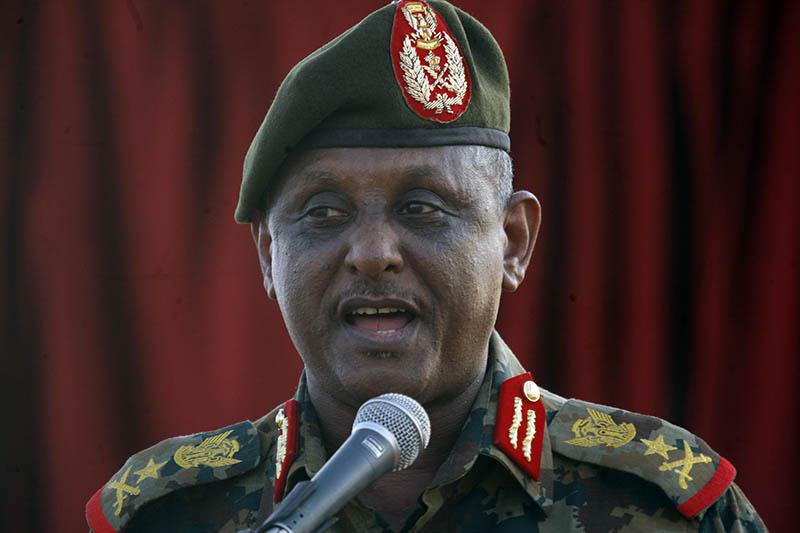
November 27: Chair of the Civil Front to Stop the War Abdallah Hamdok stresses that there is “no legitimate government” in Sudan that can terminate UNITAMS. Egypt ‘should ease visa procedures for Sudanese drivers and patients’.
November 28: SAF Deputy Commander El Atta accuses ‘mafia state’ Emirates of supplying the RSF with arms. ‘RSF atrocities in Sudan and Darfur signify political defeat,’ says Suliman Baldo. Darfur Wali Minni Minawi calls for urgent negotiations in Sudan. Merchants complain that the Central Bank of Sudan policies ‘restrict commercial activity’.
November 29: The UN secretary-general blames ‘El Burhan-Hemedti power struggle‘ for the current catastrophe. The newly founded Democratic Civil Forces alliance (Tagaddum), chaired by Hamdok, approves a draft roadmap to end the war and enable a democratic civil transition.
November 30: Air strikes on Babanousa in West Kordofan violate a tripartite agreement signed between the SAF, RSF, and native administration leaders.
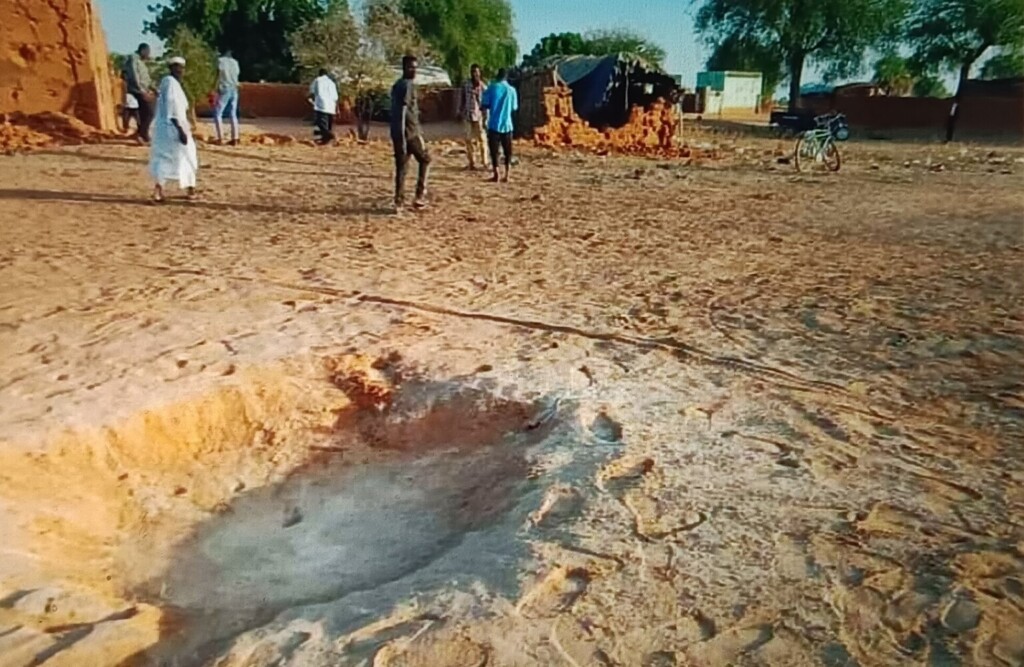
December: The RSF takes control of El Gezira’s capital Wad Madani, triggering fears of RSF raiding northern and eastern Sudan. The air force intensifies attacks on Khartoum. Hate speech, detentions, and also army mobilisation are openly based on ethnical motives. Hunger levels are the ‘highest ever recorded’ in Sudan. US Secretary of State Anthony Blinken accuses both warring parties of ‘horrific’ war crimes. HRW says that his statement needs to be followed by ‘robust action’. During the IGAD summit on Sudan, El Burhan agrees to meet with Hemedti, but this is denied by the FA Ministry. He reportedly changed his position again later this month. The newly formed Tagaddum alliance, headed by Hamdok, requests meetings with El Burhan and with Hemedti. Hemedti visits a number of African countries.
December 1: The UNSC ends the mandate of UNITAMS. Abdallah Hamdok meets with Chad President Idris Deby in the UAE.
December 3: The SAF-RSF talks in Jeddah are suspended again.
December 4: The international Expanded Mechanism for Sudan urges for an ‘inclusive political dialogue’ in the country after the failure of the latest Jeddah round. Battles continue in greater Khartoum. The RSF says that El Burhan’s latest speeches show that the SAF command is deeply troubled. The RSF ae still besieging El Obeid.
December 5: The RSF attacks an SPLM-N base in South Kordofan. Tensions rise between the Emirates and Sudan over armament accusations.
December 6: US Secretary of State Anthony Blinken accuses both SAF and RSF of ‘horrific’ war crimes. The RSF seize Sudan telecoms.
December 7: More than 100 people are killed in airstrikes in Khartoum state. People living in Delling, South Kordofan, fear an expansion of the SPLM-RSF fighting in the area. Soaring prices ‘will lead to a famine’ in Darfur. The Sudanese Foreign Ministry rejects Blinken’s ‘equating between the army and the RSF’.
December 8: Hamdok meets with South Sudanese President Salva Kiir in the UAE.
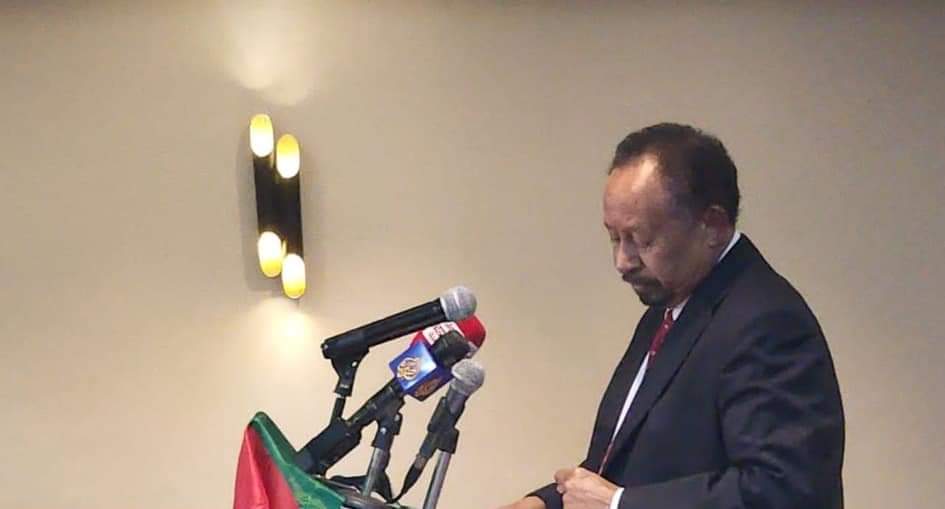
December 9: During the special IGAD summit in Djibouti on Sudan, El Burhan agrees on a bilateral meeting with the RSF commander. Hemedti, who is not present, also agrees on the meeting.
December 10: OCHA reports an ‘alarming number of malnutrition cases‘ in Sudan. The FA Ministry denies that El Burhan agreed to meet with Hemedti. Two die in an army attack on a Red Cross convoy in Khartoum. Sudan declares 15 Emirati diplomats persona non grata.
December 11: Washington warns against a division of Sudan. Dozens are killed in fighting in Omdurman. HRW says that the US condemnation of the atrocities in Sudan needs to be followed by ‘robust action’.
December 12: The WHO reports that hunger levels are the ‘highest ever recorded’ in Sudan. SAF accusations of collaboration with the RSF now also rattle Sudan’s relations with Chad. The RSF plans to establish a ‘federal police force’ in the country’.
December 13: The Sudanese Pound rate reaches unprecedented lows. People in South Kordofan are facing deepening humanitarian woes.
December 14: Fierce SAF-RSF fighting is reported near Wad Madani, capital of El Gezira. Six die in airstrikes on Nyala. Fighting renews in Khartoum North, the RSF attacks activists in Omdurman. The US Department of State’s Africa Media Hub discusses the ‘horrific violence’ in Sudan. Emergency Lawyers reports more than 50 new rape cases in South Darfur.
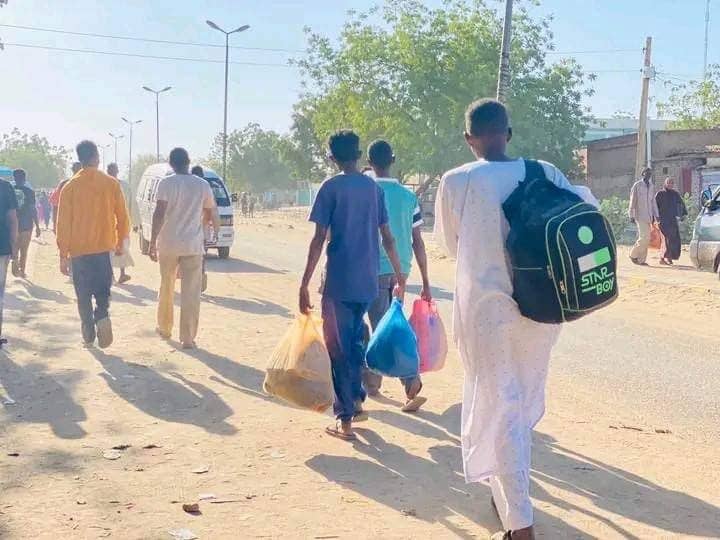
December 15: The authorities in El Gezira issue a curfew following RSF attacks on areas near the state capital Wad Madani.
December 16: SAF-RSF clashes break out in North Darfur’s capital and the adjacent Abu Shouk camp. Chad expels four Sudanese diplomats.
December 17: Hundreds of youths from Darfur and Kordofan are held in El Gezira on suspicion of supporting the RSF. A humanitarian crisis unfolds in El Gezira amid a mass exodus from the capital.
December 18: The RSF takes control of Wad Madani. The ongoing airstrikes on Nyala, are becoming a “haunting concern“ for its residents. Negotiations over the Renaissance Dam in Ethiopia resume in Addis Ababa.
December 19: Numerous Sudanese criticise the army for letting the RSF take control of El Gezira in central Sudan The US Congress calls on the Emirates to ‘stop interfering in Sudan’. Civil society organisations condemn the surge in ‘ethnic hatred’ in the country. Sudanese have little to celebrate the fifth anniversary of the start of the 2018 December Revolution.
December 21: Diplomatic sources say that El Burhan has changed his position again and will meet with Hemedti. UNICEF warns that the violence in El Gezira endangers three million children. RSF units enter White Nile state and Sennar, causing people in neighbouring El Gedaref to panic.
December 22: A delegation of the Democratic Civil Forces alliance (Tagaddum), chaired by Abdallah Hamdok, concludes its meetings with President Ruto in Nairobi.
December 23: Dozens are killed in RSF fighting with the Sudan Liberation Movement, led by Abdelwahid El Nur (SLM-AW) in Central Darfur. People begin to flee White Nile state after rumours about the RSF planning to invade the area. Military Intelligence detains volunteers helping displaced people in Sennar capital.
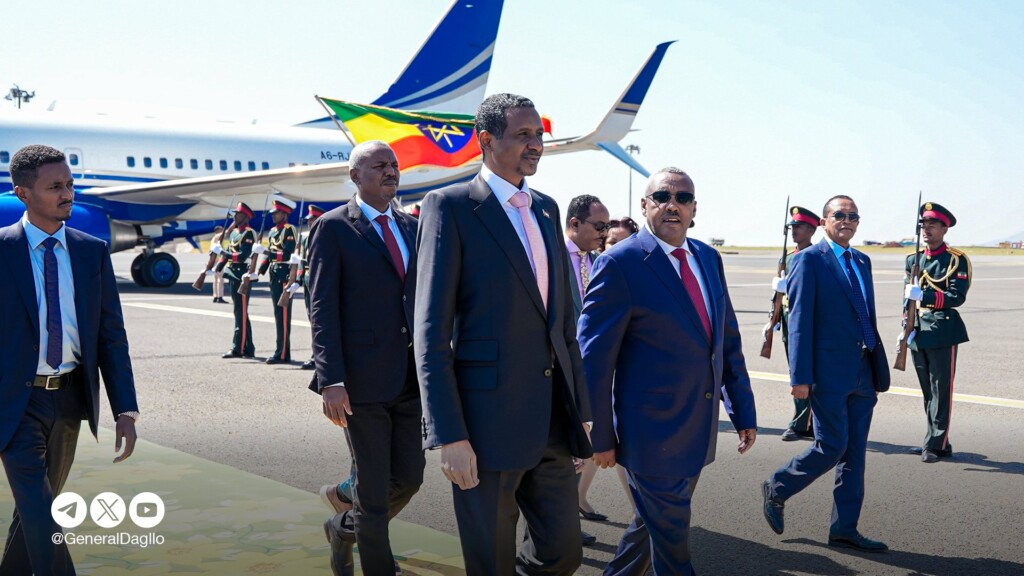
December 25: River Nile state authorities set up an ethnically-based mobilisation campaign to counter a possible RSF invasion. The RSF says that ‘We’ll hand areas under our control to the people, not the army‘.
December 26: Hamdok requests meetings with El Burhan and with Hemedti. According to the Centre for International Private Enterprise (CIPE), Sudan so far lost $15 billion to the war. The Sons of Wad Madani agree with the RSF to reopen health facilities in El Gezira.
December 27: Hemedti starts his Africa tour and meets with Ugandan President Yoweri Museveni. Babanousa in West Kordofan fears a new RSF offensive. RSF and the army clash near the Sennar Sugar Factory, Military Intelligence detains activists in Sennar and Singa. New clashes take place near the Engineers Corps in Omdurman.
December 28: Hemedti meets Ethiopian PM Abiy in Addis Ababa. Conditions deteriorate for Darfuri refugees in Chad. A former health minister calls for urgent intervention to provide ‘minimum health services in Sudan‘.
December 30: Human rights groups consider the detentions of activists in Sudan ‘an attempt by remnants of the Al Bashir regime to regain power‘. The Justice and Equality Movement (JEM) calls on the UNSC to impose a non-fly zone over Sudan. The FFC-CC urges the SAF and RSF to respond to negotiation calls.
December 31: Hemedti visits the president of Djibouti. El Burhan lashes out at the African countries that recently received Hemedti, saying that they ‘are partnering in RSF crimes’. Hemedti calls on the Sudanese ‘to engage in dialogue to end the war‘. The Darfur Bar Association urges UN action against the ‘war crimes’ committed in the country.
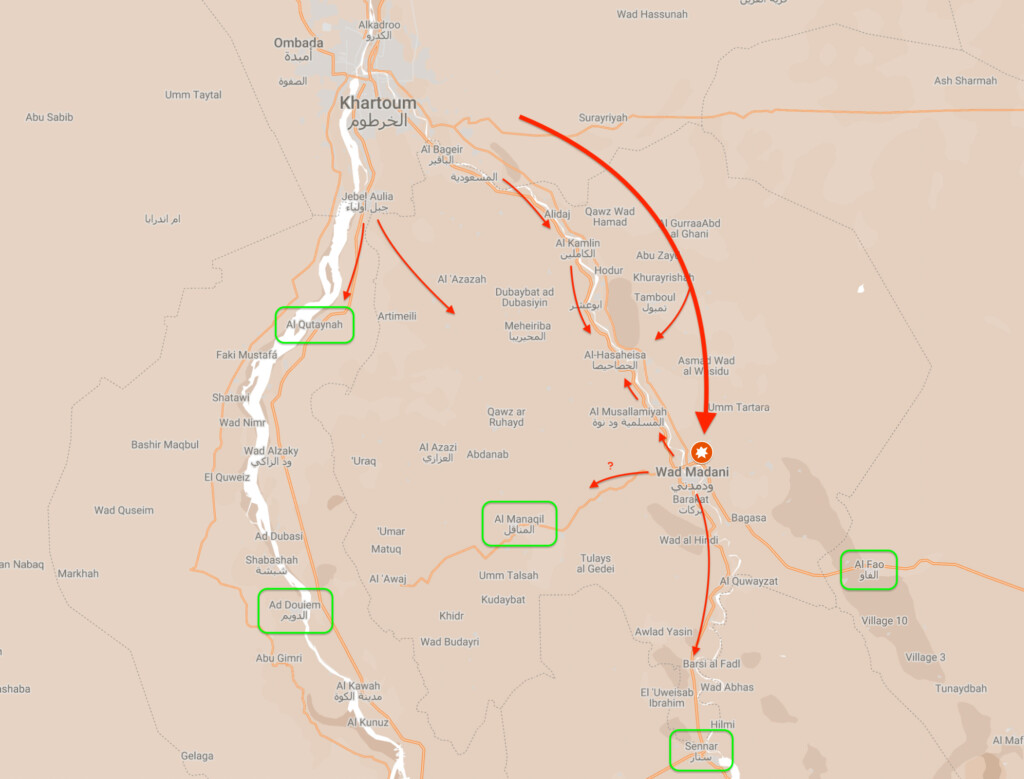
Previous timelines
Sudan timeline July-September 2023: Sudanese ‘in survival mode’
Sudan timeline April-June 2020: Covid-19 marks all aspects of life, inflation soars
Sudan timeline January-March 2020: Little relief to the country’s economic, security woes
Sudan timeline October-December 2019: Interim government put to the test
Sudan timeline July-September 2019: Turbulent transformation from tyranny








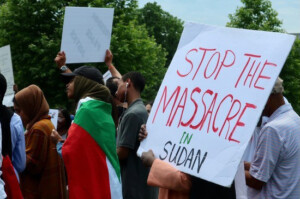
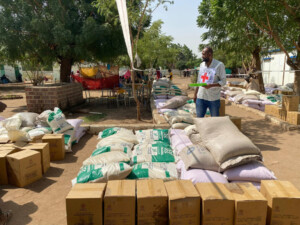

 and then
and then